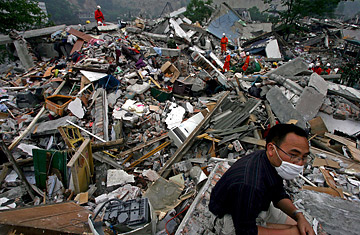
A man sits alone as several rescue workers search for survivors on collapsed buildings in Yingxiu in China's Sichuan province.
One week after the devastating earthquake in China's Sichuan province, Yingxiu is filled with signs of loss — but also of hope. This town of 10,000 was one of the hardest hit by the magnitude 7.9 temblor, and less than half of the population is believed to have survived.
The elementary school was destroyed, taking with it the lives of more than 400 students. The green mountains that surround the town look as if they have been clawed by angry giants; landslides have stripped the slopes bare, burying roads and dumping tons of rock and soil into the nearby Min River. At one entrance to the town a raised highway has been cut down like a ribbon. At the other end a car sits in an intersection, crushed by a boulder. A traffic police station tilts at a nauseating angle. Most of the town has been cleared of bodies, but a few exposed corpses remain jutting out of collapsed buildings. An unknown number are buried below.
On May 19 at 2:28 p.m., the military rescue forces in town marked the one-week anniversary of the earthquake by blasting the horns of their vehicles, part of national period of mourning that will last three days. The death toll has now surpassed 34,000, and the government says it's expected to reach 50,000. Around the country flags flew at half-staff and citizens observed three minutes of silence in memory of the dead. But in Yingxiu there was little time for rest. At an office of the local electric power plant, troops were still trying to save a man in his early 30s who, remarkably, remained alive but was imprisoned by wreckage of a collapsed building. Orange-suited rescuers stood on top of the debris pile, looking for ways to pull him out as if trying to solve a gigantic concrete puzzle. "He's trapped but not crushed," said a soldier at the scene. "We have to go very slowly." Workers kept the man alive by feeding him liquids while they waited for the delivery of equipment needed to free him.
Near the center of Yingxiu, Wu Jiang, 30, pokes with a stick at the remains of the apartment block where his family lived. He was near Chengdu when the quake hit and was uninjured. But his mother, who was napping at home, did not survive. He has twice walked in from Dujiangyan, a distance of nearly 22 miles (35 km), to visit his home. He was in town when Chinese Premier Wen Jiabao spoke to the survivors and rescue workers last week, but he didn't have the heart to attend. "I don't know what the future will be like here," Wu says. "This place doesn't seem suitable for human life."
Wu walks to a dusty lot near the river. "This was a piece of land meant for development," he says. "Now there is no hope." A group of survivors has gathered for lunch under a tent. They have come from the mountains above the town. That they have chosen to relocate to the wasteland of Yingxiu hints at the destruction in their villages. Gesturing at the rich lunch of beer and roast pork, Zhang Jian, 34, says, "The truth is, we have nothing."
But hope still glimmered at the power plant. Rescuers say the odds of finding survivors are highest during the first "golden 72 hours" after an earthquake. After that, the chances for those still pinned under rubble begin to decline precipitously, because of lack of food and water. Yet shortly after midnight, rescuers pulled the man trapped in the collapsed building, the state-run Xinhua News Service reported. He was identified as Ma Yuanjiang, an executive with the power company. It had been 178 hours — almost seven and a half days — since the quake decimated Yingxiu.
— with reporting by Lin Yang/Yingxiu
